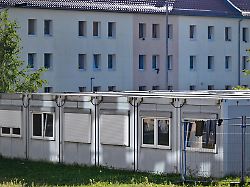“Should work regularly”
FDP rejects compulsory jobs for asylum seekers
September 18, 2023, 12:24 a.m
Listen to article
This audio version was artificially generated. More info | Send feedback
While the SPD sees asylum policy proposals from Bavaria’s Prime Minister Söder as pure populism, the FDP prefers a factual discussion. The Liberals reject compulsory work. Municipalities are already allowed to distribute chip cards instead of cash everywhere.
The FDP in the Bundestag has rejected Bavaria’s Prime Minister Markus Söder’s proposal for asylum seekers to be required to work. “In view of the shortage of work and skilled workers, asylum seekers should be brought into the regular labor market,” said the Parliamentary Managing Director of the FDP, Stephan Thomae, to the Editorial Network Germany (RND). “A commitment to charitable work has the disadvantage that municipalities then compete with private service providers with cheap labor.” Rather, the goal must be to integrate immigrants into the labor market as quickly as possible so that they can earn their own living, said Thomae.
Regarding the switch from cash to benefits in kind, the Liberal explained that, according to the law, municipalities can already decide for themselves whether to grant asylum seekers benefits in kind or pay out money. “Many municipalities opt for cash payments because it involves less effort,” says Thomae.
The CSU boss had announced that rejected asylum seekers in the Free State would soon no longer be given money, but rather chip cards for limited purchases of certain everyday goods. He is also planning a program so that asylum seekers can do more community work until their residence status is decided. “This should be done everywhere in Germany,” Söder told “Bild am Sonntag”.
Union faction supports Söder
While the SPD viewed Söder’s initiative as populism, support came from the CDU/CSU parliamentary group, combined with criticism of the traffic lights. Domestic policy spokesman Alexander Throm welcomed the use of asylum seekers for charitable work, but spoke of a “huge backlog” among recognized asylum seekers: “Despite the enormous need for workers, almost every second immigrant from the asylum country of origin still receives social assistance,” said Throm RND.
Payment cards instead of cash for rejected asylum seekers are “an important building block for the asylum transition,” he continued. “Our high social standards are a significant incentive for irregular migration.” In addition, the federal government also needs to do more to combat incentives for irregular migration: “It cannot be the case that the states and municipalities have to take on this alone,” said Throm.
“Extend the list of safe countries of origin”
This includes an expansion of the safe countries of origin, according to the Union politician: The fact that the traffic light only wants to add Georgia and Moldova to the list is “just a drop in the ocean of the migration crisis,” Throm told the RND. “The Maghreb states of Algeria, Morocco and Tunisia must also urgently be classified as safe countries of origin in order to relieve the burden on the authorities and to be able to repatriate those obliged to leave the country more quickly.”
FDP politician Thomae also spoke out in favor of examining other states. “We need relief for the German asylum system,” he said. The classification of Georgia and Moldova as safe countries of origin is a noticeable step in this regard. “We should also check the classification of other countries,” he demanded. “However, a classification as a safe country of origin only makes sense if rejected asylum seekers, criminals and those at risk can actually be deported. This requires additional agreements.”
